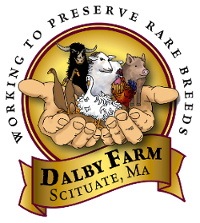5 common Mistakes new Farmers make & how to avoid them
Watch or read below!
Hey everyone! Welcome back to Dalby Farm. Sorry it’s been a little while since my last update—I’ve been out of town for the past week, doing some really exciting things. But more on that later!
For now, I want to take a moment to talk to those of you who are new to farming or are thinking about starting your own farm. There are some common mistakes that many beginner farmers make, and I don’t want you to be one of them. So today, I’m going to share five of those mistakes with you—and more importantly, I’ll explain how you can avoid them. Let’s get into it!
1. Overbuying Animals
When you're first starting out, it's easy to get excited about the idea of owning a variety of animals. After all, it’s tempting to dream of having chickens, goats, pigs, and cows all on your property. But trust me, starting small is key.
If I were you, I would recommend starting with chickens. Chickens are relatively easy to care for and are a great introduction to animal husbandry. It’s easy to get excited and purchase more livestock than you’re ready to handle, but that can quickly become overwhelming.
By starting with a manageable number of animals (or birds, in this case), you can get comfortable with the daily care and responsibilities that come with farming. Once you’ve gained some experience, you can expand your herd or flock. The last thing you want is to feel overwhelmed before you’ve even had time to enjoy or learn the basics of farming.
2. Neglecting Soil Health
Soil is the foundation of your farm. It's where everything begins—whether you’re growing crops or maintaining pastures for animals. If your soil is unhealthy, you’ll struggle to grow strong crops, and your pastures won’t be as productive, which will affect the health of your animals.
Many new farmers make the mistake of thinking soil care isn’t that important or that it’s something they can just ignore. But investing in soil health is essential for a productive and sustainable farm.
Make sure you're testing your soil regularly and adding organic matter like compost or mulch to keep it fertile. A solid foundation of healthy soil will lead to better crops, healthier animals, and a more productive farm overall.
3. Underestimating the Time Commitment
Farming takes a lot of time—and it’s not just about planting seeds and feeding animals. It’s a full-time commitment. One of the biggest mistakes new farmers make is underestimating how much time farming actually takes.
Between caring for crops, animals, and maintaining equipment, farming can take hours of work every single day. Before you jump in, make sure you’re truly ready to commit the necessary time and energy to your farm. It’s better to start slow or even part-time and gradually build up your farm operations as you learn.
Starting small can save you a lot of stress and frustration in the long run. Farming can be incredibly rewarding, but it’s important to pace yourself, especially in the beginning.
4. Failing to Plan for the Seasons
Planning for the seasons is another common mistake many new farmers make. Obviously, this depends on where you live, but if you're in a place like New England (where I am), the weather can be unpredictable. The one thing you can always count on, though, is the changing seasons.
Whether you’re dealing with extreme heat in the summer or freezing temperatures in the winter, it’s essential to be prepared. That means making sure your animals have proper shelter, your crops are protected, and you have enough feed, water, and bedding to get through the colder months.
Not to mention, things like hay, grain, and a solid water plan should be stocked up and ready. With a little bit of planning, you’ll be able to handle whatever Mother Nature throws your way.
5. Not Building Strong Fences
Let’s talk about fencing—a big one! A lot of new farmers underestimate the importance of strong, secure fences. Whether you're raising cattle, sheep, chickens, or any other animals, a weak or poorly built fence will lead to all kinds of headaches. Escaped animals, predators getting in, and the stress of chasing down livestock are just a few of the problems you’ll encounter with flimsy fences.
Invest in good-quality fencing materials and make sure your enclosures are strong enough to handle your livestock. This is a single investment that will save you so much time, money, and frustration down the road. Don’t skimp on your fencing—it’s a fundamental part of farm life.
Conclusion
Starting a farm is an exciting journey, but it can also be a challenging one. The good news is that by avoiding these five common mistakes, you’re already off to a great start. Remember, it’s all about learning as you go and taking it one step at a time. Farming is a process, and there’s always something new to learn!
If you found this post helpful, don’t forget to like, subscribe, and leave a comment below with your own farming tips or questions. I’d love to hear about your experiences and what’s worked for you on your farm.
Thanks for reading, and I’ll see you next time!
